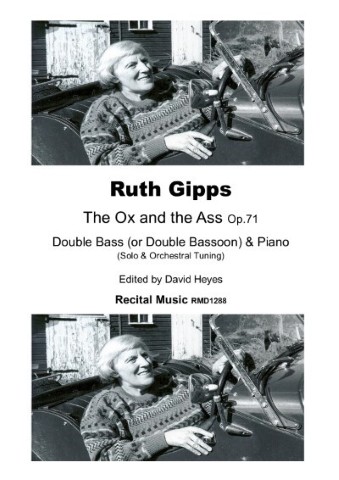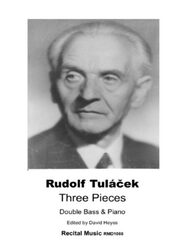The Ox and the Ass Op.71
Introduction and Carol

Composer: Gipps, Ruth
Editor: David Heyes
Instrumentation: Double Bass (or Double Bassoon) and Piano
Publisher:
| Product Code: | RMD1288 |
| Publishers Number: | RMD1288 |
| Language: | English |
| Condition: | New |
She played oboe and cor anglais with the City of Birmingham Symphony Orchestra (1944-5) and subsequently began a conducting career which was certainly an unusual step for a woman in the 1940’s and 50’s. Undaunted, she founded the London Repertoire Orchestra in 1955, which she ran until 1986, the London Chanticleer Orchestra in 1961, and was offered conducting work with the London Symphony Orchestra, Boyd Neel Orchestra and Pro Arte Orchestra.
Alongside her conducting and composing commitments, Ruth Gipps spent much of her life as a Professor of composition and harmony, including appointments at Trinity College of Music (1960-66), Royal College of Music (1967-77) and from 1977 as Senior Lecturer in Music at Kingston Polytechnic (now University). In 1967 she became the second woman to chair the Composers’ Guild of Great Britain and was awarded an MBE in 1981.
Dr. Jill Halstead, a leading academic writes: ‘Stylistically her work parallels the other British composers of her generation who were influenced by the folk song revival and the new Franco-Russian movement. Her style is easily accessible and rich in character, marked by use of highly melodic tonal/modal themes and vibrant orchestration; harmonically her work can be chromatically complex yet never fully leaves the realms of tonality.’
Ruth Gipps died on 23 February 1999 at the age of 78.
Ruth Gipps' The Ox and the Ass was originally scored for double bass and piano, or double bass and chamber orchestra, this exquisite miniature has…
The Ox and the Ass was also arranged for Contra Bassoon and Piano by the composer and it was recorded in 1997 by the American player Susan L. Nigro on Little Tunes for the Big Bassoon (Crystal Records CD348).
The edition is published with piano accompaniments for both solo and orchestral tunings. Also playable by contra-bassoon and piano, and a solo part is included.
A version with chamber orchestra accompaniment is available from Recital Music.
The Ox and the Ass was completed on 26 October 1988 and is dedicated to Russell Killick, who gave the first private performance in December 1990 with the Salon Orchestra at the Royal Artillery Officers’ Mess.
The first public performance was at Wells Cathedral School on 12 June 1999 by Alexandra Hengstebeck (double bass) and Mark Cracknell (piano).
Digital Download – PDF
Shipping costs: No shipping
R.R.P £8.50
Our Price: £7.23
You might also like
-
20 Melodic Pieces Book 1
£7.23 -
3 Pieces for Double Bass and Piano
£10.63 -
3 Random Rambles
£7.23 -
6 Christmas Carols
£10.63




